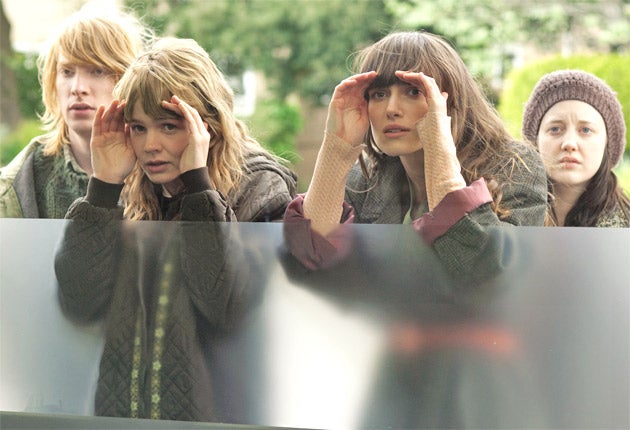Never Let Me Go, Toronto Film Festival

Your support helps us to tell the story
From reproductive rights to climate change to Big Tech, The Independent is on the ground when the story is developing. Whether it's investigating the financials of Elon Musk's pro-Trump PAC or producing our latest documentary, 'The A Word', which shines a light on the American women fighting for reproductive rights, we know how important it is to parse out the facts from the messaging.
At such a critical moment in US history, we need reporters on the ground. Your donation allows us to keep sending journalists to speak to both sides of the story.
The Independent is trusted by Americans across the entire political spectrum. And unlike many other quality news outlets, we choose not to lock Americans out of our reporting and analysis with paywalls. We believe quality journalism should be available to everyone, paid for by those who can afford it.
Your support makes all the difference.The age of the principal protagonist in this adaptation of Kazuo Ishiguro's novel has been reduced from 31 to 28 to facilitate the use of the cream of young British acting talent – Carey Mulligan, Keira Knightley and Andrew Garfield.
In the novel, Ishiguro waits patiently before making the major reveal that all three characters are being bred for their body parts. Here, the director Mark Romanek (famed for his music videos) can't wait to get the dirty secret that the trio are born-to-die young off his chest.
Before the first image, an inter-title informs that there has been a medical breakthrough in the 1950s that will allow people to live longer. But far from setting up a mystery tale about why life in the seemingly idyllic boarding school, Hailsham, is parentless and odd, it's just a preview for the fact that any sense of suspense from the novel will be nipped in the bud before it has a chance to play out on screen.
Mulligan has the principal role, playing the timid carer Kathy. It's an understated, interior performance, delivered with the minimum of fuss. Knightley also excels as her best friend, Ruth, who is wild, popular and compulsive. They are chalk and cheese and their relationship is love-hate, especially after Ruth starts dating Tommy (Garfield), creating a love triangle that extends beyond their time at boarding school.
The casting of the younger versions of Ruth and Kathy is quite impressive. Isobel Meikle-Small as the young Mulligan and Ella Purnell as the young Knightley not only look like the actors, they also capture their mannerisms. Indeed, the acting is the highlight of the movie, including from those in minor roles, such as Charlotte Rampling as the school's strict headmistress.
But none of the performances can cover the fact that the film-makers don't seem to have much faith in the twist in the source material. It doesn't take long before new teacher Miss Lucy (Sally Hawkins in an underwritten, one-tone role) spills the beans that the kids have an extremely short and painful life ahead of them. She is sacked the next day.
The emphasis is placed on the characters' feelings towards each other, rather than them being bred as donors. This plotting allows the film-makers to concentrate the story on the trio as adults, living in a secluded village known as The Cottages, so making the most use of its name actors. In the Cottages they meet up with donors from different schools, including the dowdy Chrissie, Andrea Riseborough in this pivotal cameo shows off her remarkable ability to look different in every part.
The threesome learn that there is a special dispensation which allows donors who are in love with each other to have a few years together before they are forced to donate their body parts. The caveat is that the couple must somehow prove that they are really in love with each other. This puts a strain on the relationship between Ruth and the unhinged Tommy, as all three friends know that the more natural partnership is between Tommy and Kathy.
Romanek wants to make a mood piece about the nature of love, The lack of dramatic tension means it's difficult to emotionally connect with the central characters and their dilemma.
Join our commenting forum
Join thought-provoking conversations, follow other Independent readers and see their replies
Comments